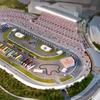
The Nashville Fairgrounds Speedway is one step closer to restoration after the Metro Fair Board approved a contract between Bristol Motor Speedway and Metro in March.
Next, the project will go before Metro Council for three readings, likely to be presented within the next 30 days, and the Sports Authority for one vote.
If approved, the 30-year lease will allow Bristol Motor Speedway to operate, manage and maintain the Fairgrounds Speedway. The project would be financed by 30-year revenue bonds issued by the Sports Authority, $17 million from the state and $17 million from the Nashville Convention & Visitors Corp. The bonds are backed by revenue streams including rent payments, sponsorships, ticket taxes and event revenue sharing.
“What you have here is very unique. You have the second-oldest-continuously operated racetrack in the country that is chartered and protected. So, it’s a piece of Nashville that’s going to stay here. With that historic venue, how do you make it a great experience for not only the city and the residents in that neighborhood, but also able to bring a premier sport and international exposure like NASCAR into that facility?” Jerry Caldwell, president of Bristol Motor Speedway, told the Business Journal. “With this plan we’ve laid out, we’re able to accomplish that by saving the venue and turning it into a facility that can be a better fit for that neighborhood and for the city as a whole.”
If the project is approved, renovations would take around 18 to 24 months, Caldwell told the Business Journal. The reimagined speedway, which originally opened for auto racing in 1904, would have a grandstand with a capacity of around 30,000, a renovated racing surface, sound absorption additions to decrease noise by 50% and new event facilities.
Aside from race weekends, limited to ten a year, the project is designed to make the Fairgrounds Speedway a year-round venue.
Similar to its other speedways, Bristol envisions the Fairgrounds as a place for community organizations’ and companies’ events as well as utilizing the track itself for things like car manufacturers wanting to showcase or test vehicles or bicycle groups that have a history of riding to the Fairgrounds, Caldwell said.
In terms of transportation and parking, the new design could increase parking capacity inside the racetrack by 50% for non-racing events and coordinate parking plans involving ride shares, transportation between parking areas and the track or a bus system during race days.
“We are making sure that we share the facts with the residents, neighborhoods and elected officials as we go through council. We think, if you really look at the facts and the information related to this, this is a really good project and a really good deal for the city,” Caldwell said. “[The Fairgrounds Speedway] needs a large investment. We are able to move that off of the taxpayers and the city and move it on to us and private operators and the users and turn it into a first-class facility while making it a better experience for the neighborhood and for the stakeholders in the area and create something that can be used year-round.”
Nashville Business News – Local Nashville News | The Nashville Business Journal